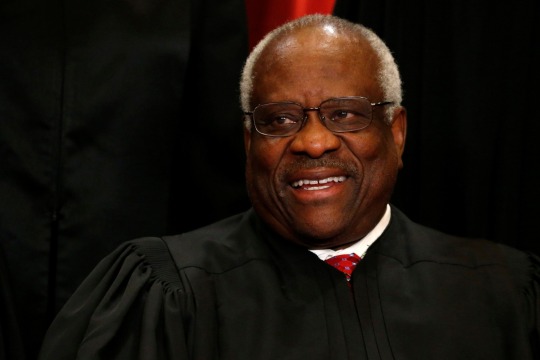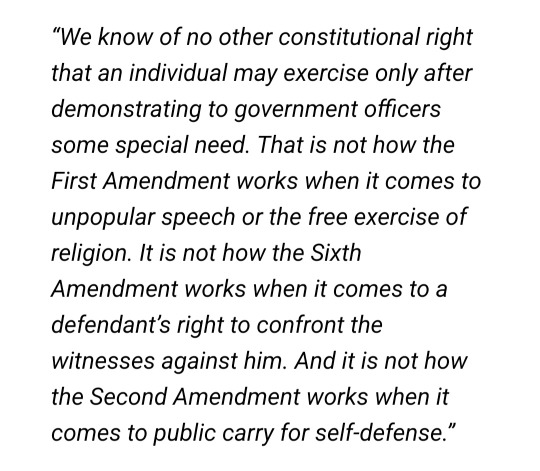#Justice Clarence Thomas
Text

#us politics#republicans#conservatives#twitter#tweet#ian millhiser#gop#us supreme court#justice clarence thomas#justice samuel alito#harlan crow#paul singer#scotus#private jets#billionaires#fuck billionaires#student loans#student loan debt#student loan forgiveness#freeze student debt#student debt forgiveness#2023
137 notes
·
View notes
Text
By Steven Lubet
In an unprecedented move, the Senate Judiciary Committee has advanced a bill requiring the Supreme Court to adopt a code of conduct and to create a mechanism for investigating alleged violations of the code and other laws.
It is no secret that the Supreme Court Ethics, Recusal and Transparency Act was prompted in part by investigations into several Justices’ deficient financial disclosures, receipt of extravagant gifts, questionable transactions and misuse of staff. The full court has consistently resisted adopting such an ethics code, but certain Justices’ justifications for their questionable conduct only hurt their cause.
Their excuses were all remarkably flimsy, almost beyond belief.
Justice Clarence Thomas began the round of rationalizations when Pro Publica reported that he had enjoyed decades of lavish vacations at the expense of billionaire Republican donor Harlan Crow — including cruises in Indonesia and the Greek Islands on Crow’s superyacht — none of which were included as gifts on Thomas’s financial disclosure forms as required by the Ethics in Government Act.
In a one-paragraph statement, Thomas opaquely claimed that he had sought guidance early in his tenure on the court from unnamed “colleagues and others in the judiciary,” who advised him that “this sort of personal hospitality from close personal friends” was not reportable.
Thomas has never revealed the identities of his alleged ethics advisors, but it is notable that no Justice or Judge has stepped forward to take responsibility for his decidedly lax interpretation of the disclosure rules. Whoever may have mentored Thomas, it is highly unlikely, to put it mildly, that any federal judge in the early 1990s would have understood “this sort of personal hospitality” to cover the omission of 20 years of luxury vacations at a private Adirondacks resort, a Texas ranch and California’s Bohemian Grove, ferried on a private jet (not to mention payment of private school tuition for the Justice’s nephew and the purchase of his mother’s home).
As excuses go, “somebody once told me it was okay” is about a step above “the dog ate my homework,” but it is still better than Thomas’s earlier excuse for not disclosing years of his wife’s employment when Virginia Thomas was paid $686,589 by the conservative Heritage Foundation and Hillsdale College.
Upon amending 20 years of his financial reports, Thomas gave the far-fetched explanation that he had “inadvertently omitted” the information “due to a misunderstanding of the filing instructions.” It takes almost preternatural shamelessness for a Supreme Court Justice — whose job calls for parsing the most complex legislation — to insist that he misunderstood the plain meaning of “spouse’s employment” for 20 reporting years.
If Thomas’s excuses for nondisclosure were sketchy, at least he didn’t become visibly angry when he was caught. Not so Justice Samuel Alito, who made an irate preemptive strike via the Wall Street Journal editorial page when he learned that Pro Publica was about to publicize his own nondisclosures.
The Pro Publica reporters contacted Alito for comment before going live with their article about an Alaska vacation financed by prominent Republican donors. Rather than answer their questions, however, Alito took advantage of his contacts at the Wall Street Journal to get a jump on the story. He published his response several hours before Pro Publica’s post, in which he called the yet unseen article misleading and false.
There was no disputing the facts. In 2008, Alito enjoyed a three-day, all-expenses junket at a remote Alaska fishing camp owned by a wealthy conservative activist named Robin Arkley II which was apparently arranged by Federalist Society official Leonard Leo. Another guest was the billionaire Paul Singer, who flew the Justice to Alaska on his private jet. No details about the trip were listed as gifts on Alito’s disclosure forms.
Unlike Thomas, Alito claimed no preexisting friendships with his benefactors, which did not stop him from playing the “personal hospitality” card. Although the statutory disclosure exception clearly applies only to “food, lodging, or entertainment,” and not to transportation, Alito defended his nondisclosure by cobbling together several unrelated statutes in a tortured attempt to show that private jet flights constitute “hospitality facilities.”
The Justice seemed to argue that the trip had no value because he sat in “what would have otherwise been an unoccupied seat,” imposing no “extra cost” for Singer. One might expect an avowed textualist to pay more attention to the statutory definition of “gift,” which includes, for example, “free attendance at an event,” which also costs nothing to the host.
The most recent revelations involve Justice Sonia Sotomayor’s use of court staff to bolster her book sales at speaking engagements. That would have violated the lower federal courts’ Code of Conduct for United States Judges, which prohibits the substantial use of “chambers, resources or staff” to engage in otherwise permitted financial activities — if the Supreme Court had ever adopted its own version of the code.
Sotomayor’s excuse was that her “chambers staff” was only recommending “the number of books based on the size of the audience so as not to disappoint attendees who may anticipate books being available at an event.” In other words, the Justice admitted assigning a judicial assistant to keep track of book purchases relative to audience sizes, in order to maximize her potential sales.
The three Justices’ hollow rationalizations display a patronizing expectation that the public will ultimately buy whatever they say, no matter how implausible.
But to paraphrase the late Justice Robert Jackson: Supreme Court Justices do not get the last word because they are infallible; they only believe themselves infallible because they get the last word. When it comes to judicial ethics, that has to change.
#us politics#news#op eds#the hill#Steven Lubet#us supreme court#scotus#ethics rules#Supreme Court Ethics Recusal and Transparency Act#Senate Judiciary Committee#Ethics in Government Act#harlan crow#pro publica#justice clarence thomas#justice samuel alito#Robin Arkley II#Leonard Leo#Paul Singer#financial disclosure reports#Justice Sonia Sotomayor#Code of Conduct for United States Judges#2023
76 notes
·
View notes
Text
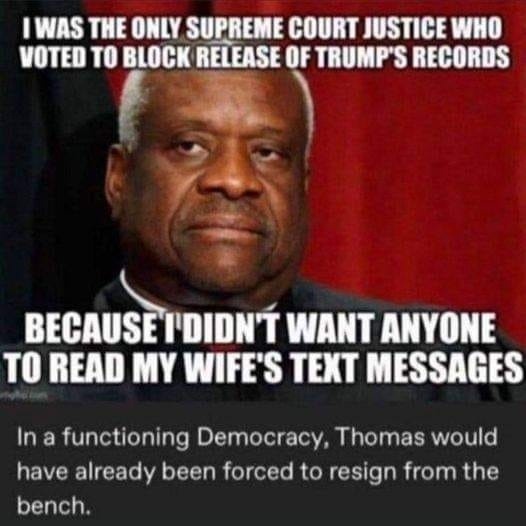

34 notes
·
View notes
Text
Tonight John Oliver set the supreme court on fire
John Oliver offered Supreme Court Justice Clarence Thomas A contract paying him one million dollars a year until he died or John dies.
In addition to that, he will give him a brand new Prevost motorcoach, which is worth 2 and a 1/2 million dollars.
All he wants in return is for justice thomas to leave the supreme court
He has 30 days to respond to John Oliver.
quite frankly, I can hardly wait to see what's going to happen Because I don't think Justice Thomas is going to respond. But I do think he's going to think about it
Great work, John. We've been waiting on you to get back and this is what we expected And more.
CHECK IT OUT
youtube
#John oliver#U s supreme court#Justice clarence thomas#Graft#Bribes#One million dollar contract#Two and a half million dollar motor home#Clarence thomas should resign#Ethics violation#Youtube
18 notes
·
View notes
Text
“You have to decide what you’re willing to die for. Until you know that, you’re negotiable.”
- Justice Clarence
16 notes
·
View notes
Text

#us politics#news#politico#us supreme court#scotus#roe v wade#Justice Samuel Alito#planned parenthood#Planned Parenthood v. Casey#justice clarence thomas#justice neil gorsuch#justice brett kavanaugh#justice amy coney barrett#justice stephen breyer#justice Sonia Sotomayor#justice Elena Kagan#Dobbs v. Jackson Women’s Health Organization#us constitution#Justice Ruth Bader Ginsburg#laurence tribe#14th amendment#us history#2022#biden administration#abortion is better than negligence#abortion is a human right#abortion is a right#abortion is not a crime#abortions#abortion bans
4 notes
·
View notes
Link
Excerpt from this story from Nation of Change:
A petition calling on the Democratic-controlled House to launch impeachment proceedings against Supreme Court Justice Clarence Thomas is on the verge of reaching one million signatures, an indication of growing public outrage over the right-wing judge’s proximity to efforts to overturn the 2020 election and his role in the ongoing attack on constitutional freedoms.
The petition, posted to the website of progressive advocacy group MoveOn, currently has more than 989,000 signatures after a surge following the Supreme Court majority’s ruling in Dobbs v. Jackson Women’s Health Organization, which ended the constitutional right to abortion.
“He must resign—or Congress must immediately investigate and impeach.”
In his concurring opinion in Dobbs, Thomas plainly stated his desire to reconsider other landmark Supreme Court rulings, including those establishing marriage equality and the right to obtain contraception.
“Thomas—who sided with the majority on overturning Roe—made it clear what’s next: to overturn high court rulings that establish gay rights and contraception rights,” reads the petition. “And if that’s not enough: Recently, Justice Clarence Thomas voted against a Supreme Court decision to compel the release of Donald Trump’s records regarding the January 6 insurrection and attempt to overturn the results of the 2020 presidential election.”
The petition also spotlights recent reporting exposing Thomas’ wife Ginni’s role in attempts to invalidate the 2020 election and keep former President Donald Trump in power. Despite his wife’s efforts, which have drawn scrutiny from the House January 6 committee, Thomas did not recuse himself from Supreme Court cases involving the 2020 election.
26 notes
·
View notes
Text
Integrity and Trust -- Gone!
Integrity and Trust. Over the past year or so, the Supreme Court, once the most trusted of the three branches of government, has lost both its integrity and the trust of the public. I turn to the wisdom of Robert Reich for his ideas on how to restore integrity and trust to the Court …
Three reforms to restore trust in the Supreme Court
On the anniversary of Dobbs, and the revelations about…
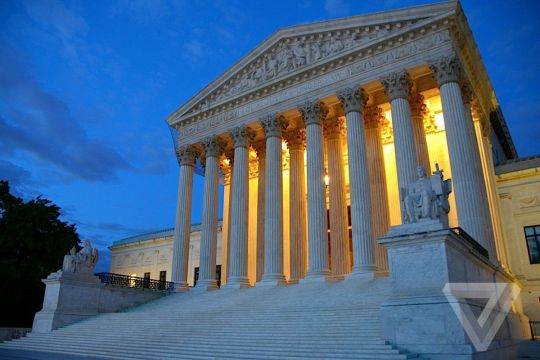
View On WordPress
#bribery#code of ethics#Dobbs v Jackson Women&039;s Health Organization#Justice Clarence Thomas#Justice Samuel Alito#Robert Reich#Roe v Wade#term limits#U.S. Supreme Court#women&039;s rights
2 notes
·
View notes
Text

What is happening?
#zelda#ganondorf#today current affairs#current events#justice clarence thomas#supreme court#ron desantis#florida#flooding#ft lauderdale
5 notes
·
View notes
Text

#us politics#2022#twitter#tweet#republicans#conservatives#gop#us supreme court#scotus#ginni thomas#justice clarence thomas#national defense authorization act#state secrets#lobbyists#jane mayer
207 notes
·
View notes
Text
By Steve Benen
By any fair measure, Justice Clarence Thomas was already one of the U.S. Supreme Court’s most controversial members, even before this year got underway. But in recent months, the far-right jurist has faced a series of ethics questions that he and his allies have struggled to answer.
Over the last three months, ProPublica has taken the lead on exposing Thomas’ unusual and previously undisclosed ties to a Republican megadonor. Over the weekend, The New York Times took the story considerably further.
At the heart of the story is an organization with a name that’s probably unfamiliar to most Americans, but which counts among its members an exclusive group of powerful and wealthy elites:
“On Oct. 15, 1991, Clarence Thomas secured his seat on the Supreme Court, a narrow victory after a bruising confirmation fight that left him isolated and disillusioned. Within months, the new Justice enjoyed a far-warmer acceptance to a second exclusive club: the Horatio Alger Association of Distinguished Americans, named for the Gilded Age author whose rags-to-riches novels represented an aspirational version of Justice Thomas’s own bootstraps origin story.”
According to the Times’ account, which has not been independently verified by MSNBC or NBC News, it was quite a pairing, as the Supreme Court Justice found a home alongside “a cluster of extraordinarily wealthy, largely conservative members who lionized him.”
The non-profit organization, which awards scholarships and promotes members’ “economic opportunity” ideals, has benefited from the association with Thomas. From the article:
“While he has never held an official leadership position, in some ways he has become the association’s leading light. He has granted it unusual access to the Supreme Court, where every year he presides over the group’s signature event: a ceremony in the courtroom at which he places Horatio Alger medals around the necks of new lifetime members. One entrepreneur called it “the closest thing to being knighted in the United States.””
Just so we’re clear, when the Times mentioned “the courtroom,” it was referring specifically to the Supreme Court’s interior chamber where Justices sit and hear oral arguments.
“The association has used access to the court ceremony and related events in the annual gathering to raise money for scholarships and other programming, according to fund-raising records reviewed by The Times,” the report added.
As for Thomas, he’s received benefits of his own, beyond simply enjoying the camaraderie of like-minded allies who were eager to celebrate him. The Times’ account highlighted the degree to which the Justices’ associations with the association’s members “brought him proximity to a lifestyle of unimaginable material privilege.”
The result was relationships in which Thomas’ Horatio Alger friends “have welcomed him at their vacation retreats, arranged V.I.P. access to sporting events and invited him to their lavish parties.”
Remember, over the last few months, the Supreme Court Justices’ principal problem was his relationship with Texas billionaire Harlan Crow, and the generosity the GOP megadonor has shown Thomas. But what the Times appears to have uncovered is a similar problem multiplied several times: Thomas “has received benefits — many of them previously unreported — from a broader cohort of wealthy and powerful friends,” thanks to his connections established through the Horatio Alger Association of Distinguished Americans.
Among the benefits: In 2016, an HBO film brought Anita Hill’s allegations against Thomas back to the fore. Soon after, a documentary titled “Created Equal: Clarence Thomas in His Own Words,” designed to defend the Justice, was released.
It was financed in part by Thomas’ Horatio Alger pals.
The Justice has not yet responded to the allegations raised by the Times.
#us politics#news#msnbc#steve benen#maddowblog#2023#op eds#justice clarence thomas#us supreme court#ethics rules#ethics violations#the new york times#propublica#Horatio Alger Association of Distinguished Americans#Created Equal: Clarence Thomas in His Own Words#corruption#scotus
34 notes
·
View notes
Text
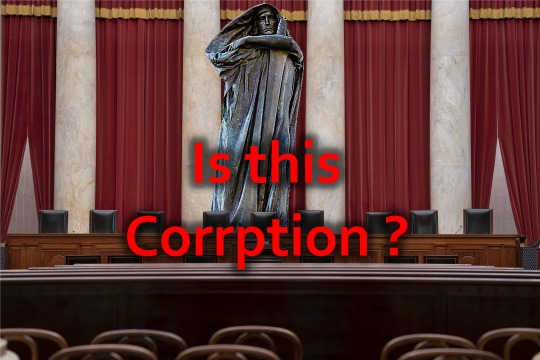

3 notes
·
View notes
Text
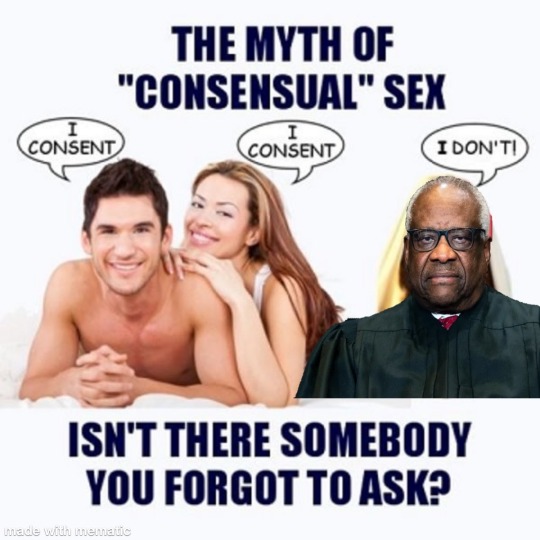
10 notes
·
View notes
Text
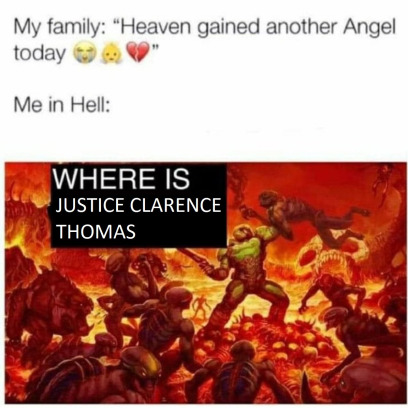
#justice clarence thomas#fuck justice clarence thomas all my homies hate justice clarence thomas#no seriously#fuck clarence thomas
3 notes
·
View notes
Text
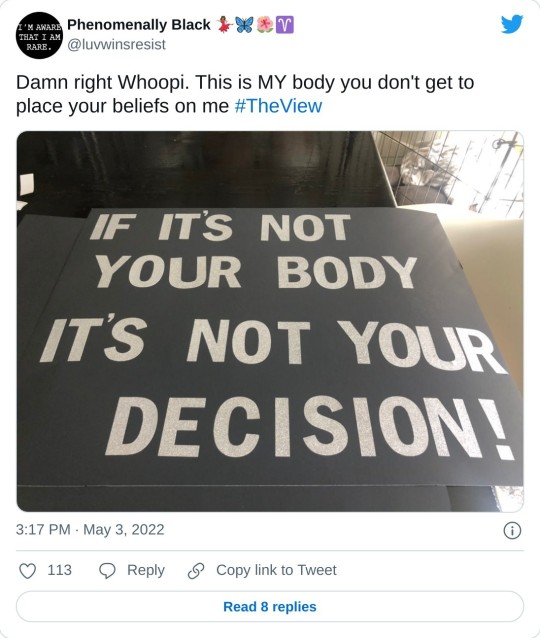
#Yes!!! 🔥🔥🔥🔥💥💥💥💥😴#Thisss#for real#yup#this this this this#honestly#this this this#us politics#news#politico#us supreme court#scotus#roe v wade#Justice Samuel Alito#planned parenthood#Planned Parenthood v. Casey#justice clarence thomas#justice neil gorsuch#justice brett kavanaugh#justice amy coney barrett#justice stephen breyer#justice Sonia Sotomayor#justice Elena Kagan#Dobbs v. Jackson Women’s Health Organization#us constitution#Justice Ruth Bader Ginsburg#laurence tribe#14th amendment#us history#2022
2 notes
·
View notes
